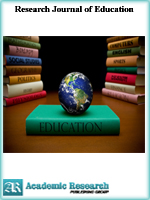Research Journal of Education
Online ISSN: 2413-0540
Print ISSN: 2413-8886
Print ISSN: 2413-8886
Quarterly Published (4 Issues Per Year)

Archives
Volume 5 Number 1 January 2019
Student-led Inquiry Learning Ability Training - Taking Distillation Experiment as An Example
Authors: Shu-fang Lv ; Di Wu ; Xiu-yan Pang ; Jian-zhong Xu ; Guo-yi Bai
Pages: 6-13
DOI: doi.org/10.32861/rje.51.6.13
Abstract
Inquiry-based study can enhance long term retention and improve application and synthesis of knowledge. In this research, we provide a student-driven, inquiry-based teaching model that trains undergraduate as researcher, who can raise questions, design and perform hypothesis-driven experiments, analyze data, and discuss results. Before students design their research projects, they should know well and answer a series of questions related to experiment principle, condition and error control, data detection, and processing, which guide them to familiarize with project principles, operations, and data processing. Continuous distillation is an ideal choice for the training in an undergraduate lab due to its synthesizing the fluid flow, heat transfer, and mass transfer. Students actively participate in the project, because their doubts can be removed through designing and implementing experiments, such as: How to evaluate the separation capacity of the distillation operation? How to implement the experiment and get the component concentration in a simple way? How to evaluate the separation capacity of the packing column? Students use their acquired research skills to design, execute, and analyze experiments independently. While, the instructors only make some adjustments to ensure that the experimenter completes the design goal within the limited experimental time. Results show that the distillation experiment builds an open, inquiry-based platform for students, which significantly enhances the ability to apply and integrate knowledge. The scientific research ability and teamwork awareness have also been nurtured.
Open Access Location of Mothers and Child Rearing Practices as a Predictor to Juvenile Delinquency Among Primary School Pupils in Borno State, Nigeria
Authors: Naomi N. Adamu
Pages: 1-5
DOI: doi.org/10.32861/rje.51.1.5
Abstract
This study surveyed Location of mothers and child rearing practices as a predictor to juvenile delinquency among primary school pupils in Borno state, Nigeria. The differences between child rearing practice among urban and rural mothers and the nature of delinquencies associated with children of mothers from the different locations were determined. The population of the study was all mothers of delinquent primary school pupils in rural and urban areas of Borno State, Nigeria and their delinquent children. Data was collected from eight hundred mothers in both rural and urban areas and the teachers of their delinquent children. Stratified purposive sampling was used to select the sample. Self-made instrument consisting of 55 items questionnaire and 26 items child delinquency rating scale with Alpha reliability index of 0.89 and 0.93 respectively were used to collect data for the study. Descriptive statistic (simple percentage, mean and standard deviation) and standard step wise multiple regression at alpha level of p<0.05 were used to analyze the data. Result indicated that there were differences in child rearing practices of rural and urban mothers and also differences in the juvenile delinquency associated with children of the different location. There is also positive relationship between child rearing and mother’s location and juvenile delinquency of primary school pupils. It is recommended that Borno State Government should put in place social facilities and security in the rural area as absence of these could result in higher level of physical and social delinquency that is already common among children of the rural women. It is also recommended that a research be further conducted to find out why personal social and physical related delinquency are common among rural children of Borno state, Nigeria.



